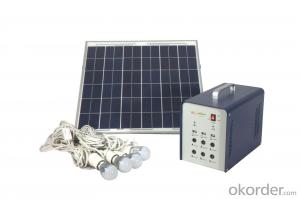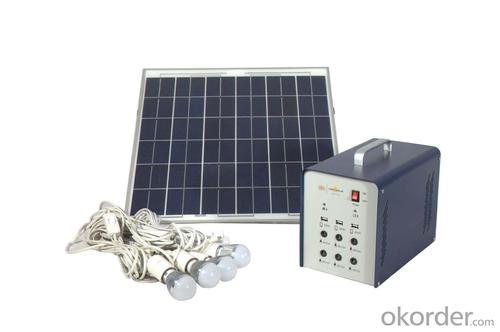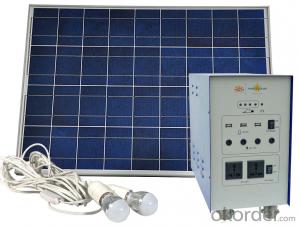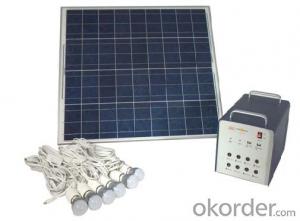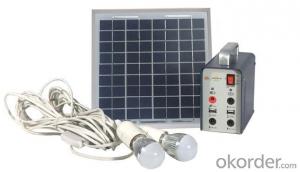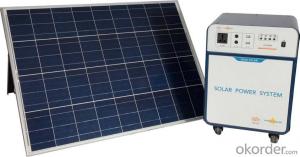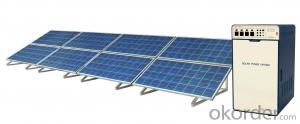Solar Energy Systems in Madurai - Home Off-Grid Solar Power System DC Lighting JS-SPS-200C
- Loading Port:
- Tianjin
- Payment Terms:
- TT OR LC
- Min Order Qty:
- 10 set
- Supply Capability:
- 10000 set/month
OKorder Service Pledge
Quality Product, Order Online Tracking, Timely Delivery
OKorder Financial Service
Credit Rating, Credit Services, Credit Purchasing
You Might Also Like
Off-grid Solar Power System
General Introduction
Solar power system provides alternating current and direct current, which is produced by the modules transforming solar power into power, to home lighting, household appliance and other DC appliance, such as cell phone and laptop.
Solar power system is widely used in area lack of power, for example house power supplying, monitoring, communication base, fire prevention in forest area, pasture and meadow, aquaculture etc.
We are dedicated to provide high quality off-grid PV products and systems to customers and has received a series of certificate, including ISO9001, TUV, UL, CE, CQC and RoHS.
Solar DC Lighting System
Multiple protection system, safe and reliable performance.
Integrated and portable design, easy operation.
DC5V, DC12V, AC220V output, wide range application.
Clean engergy, cycle use.
General Introduction
Solar power system provides alternating current and direct current, which is produced by the modules transforming solar power into power, to home lighting, household appliance and other DC appliance, such as cell phone and laptop.
Solar power system is widely used in area lack of power, for example house power supplying, monitoring, communication base, fire prevention in forest area, pasture and meadow, aquaculture etc.
We are dedicated to provide high quality off-grid PV products and systems to customers and has received a series of certificate, including ISO9001, TUV, UL, CE, CQC and RoHS.
Solar DC Lighting System
Multiple protection system, safe and reliable performance.
Integrated and portable design, easy operation.
DC5V, DC12V, AC220V output, wide range application.
Clean engergy, cycle use.
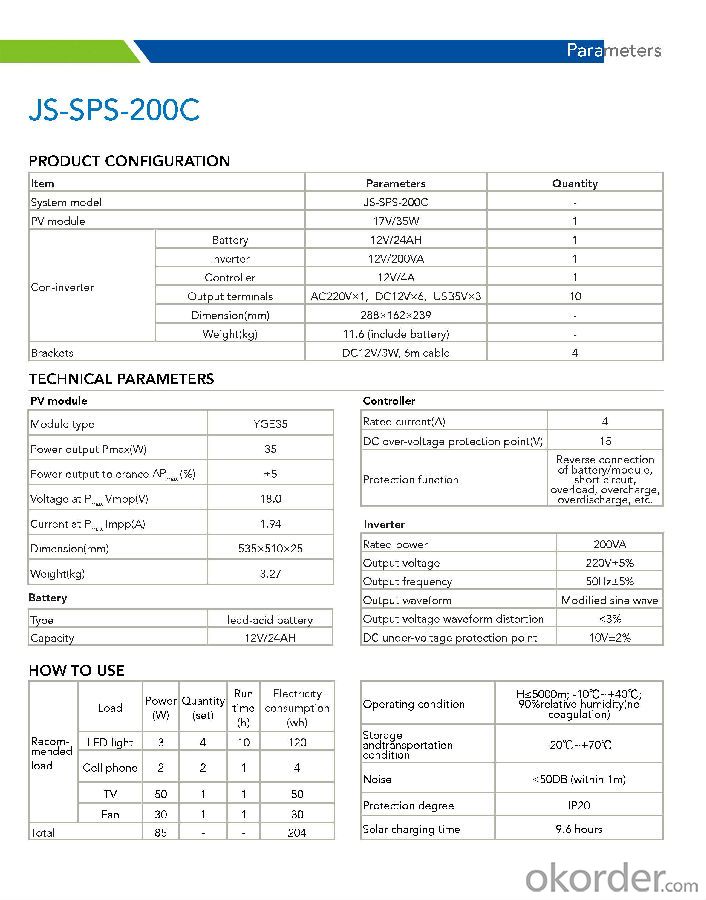
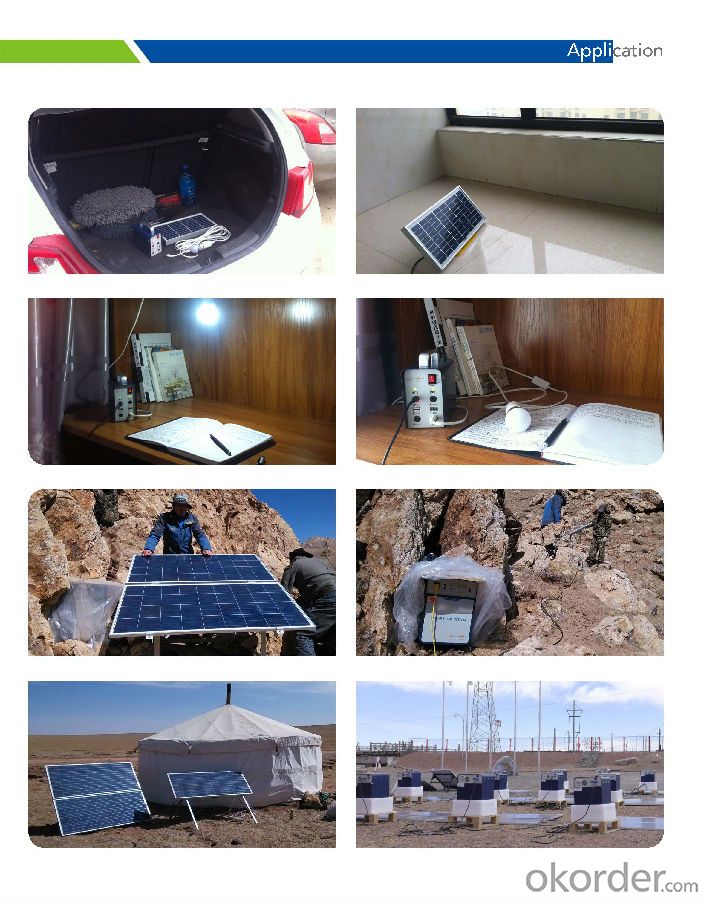

- Q: Can solar energy systems be used in areas with strict building codes or historical preservation restrictions?
- Indeed, it is possible to utilize solar energy systems in areas that have stringent building codes or restrictions on historical preservation. Although it may necessitate additional considerations and careful planning, integrating solar energy systems into the existing structures is certainly achievable. One approach to incorporating solar energy systems involves employing building-integrated photovoltaics (BIPV) or solar thermal systems that flawlessly blend into the building's design. These systems can be installed on rooftops, facades, or even utilized as shading elements, ensuring that the building's historical aesthetics or architectural integrity remain intact. Additionally, advancements in solar technology have facilitated the creation of more visually appealing solar panels, such as solar tiles or transparent solar windows, which harmonize with the building's existing materials. This simplifies the process of obtaining approval from historical preservation boards or building code authorities. It is crucial to note that in areas with strict building codes or historical preservation restrictions, the approval process for installing solar energy systems may be more complex. It may entail acquiring permits, conducting structural assessments, and closely collaborating with local authorities to ensure compliance with regulations. Nevertheless, due to the increasing recognition of the significance of renewable energy, many jurisdictions have established specific guidelines and provisions for integrating solar systems in historic areas. To summarize, it is feasible to utilize solar energy systems in areas with strict building codes or historical preservation restrictions by employing BIPV, solar thermal systems, or visually appealing solar panels. Although the approval process may require more effort, with proper planning and adherence to guidelines, it is possible to harness solar energy without compromising the architectural or historical significance of the area.
- Q: Can solar energy systems be used for powering off-grid sustainable communities?
- Yes, solar energy systems can be used to power off-grid sustainable communities. Solar panels can generate electricity from sunlight, which can be stored in batteries for later use. This renewable energy source is clean, abundant, and can be harnessed in remote areas where grid access is limited. By relying on solar power, off-grid sustainable communities can reduce their reliance on fossil fuels, lower their carbon footprint, and achieve long-term energy independence.
- Q: Can solar energy systems be used in powering agricultural irrigation systems?
- Certainly, agricultural irrigation systems can be powered by solar energy systems. As a matter of fact, solar energy is gaining popularity in the agricultural industry due to its numerous advantages. To begin with, solar energy is a clean and renewable source of power, which aids in reducing greenhouse gas emissions and combating climate change. This is especially crucial in agriculture, where conventional power sources like diesel generators contribute to air pollution. Furthermore, solar energy systems are simple to install and maintain. They typically consist of solar panels, an inverter, and a battery storage system. These components can be installed on rooftops, open fields, or even on solar trackers to maximize exposure to sunlight. Once installed, solar energy systems require minimal upkeep, resulting in reduced operational expenses for farmers. Moreover, solar energy systems are particularly well-suited for powering agricultural irrigation systems. Irrigation systems often require a constant and dependable energy source to pump water from wells, rivers, or reservoirs to the fields. Solar energy can fulfill this need for consistent power supply, particularly in sunny regions with high irrigation demands. Additionally, solar energy systems can be combined with energy storage solutions like batteries. This enables farmers to store surplus energy generated during the day and utilize it during periods of low sunlight or at night, ensuring uninterrupted power supply for irrigation systems. Furthermore, solar-powered irrigation systems can prove to be more cost-effective in the long run. Although the initial investment for installing solar panels and associated equipment may be higher compared to traditional power sources, the operating costs are significantly lower. Once the solar energy system is in place, farmers can benefit from free energy from the sun, reducing reliance on expensive fossil fuels or grid electricity. To sum up, solar energy systems are a feasible and sustainable choice for powering agricultural irrigation systems. They offer environmental advantages, are easy to install and maintain, and can provide a reliable and cost-effective energy supply for farmers.
- Q: Can solar energy systems be used for space heating?
- Yes, solar energy systems can be used for space heating. Solar thermal systems can capture the sun's energy and convert it into heat, which can then be used to warm indoor spaces. This can be achieved through radiant heating systems, solar air heating systems, or solar water heating systems.
- Q: Can a solar energy system be installed in areas with extreme weather conditions?
- Yes, a solar energy system can be installed in areas with extreme weather conditions. However, the system should be designed and installed with the specific climate in mind to ensure durability and optimal performance. Components like solar panels, inverters, and mounting structures can be chosen to withstand extreme temperatures, high winds, heavy snowfall, or other challenging weather conditions. Additionally, regular maintenance and monitoring can help identify and address any weather-related issues that may arise, ensuring the longevity and efficiency of the solar energy system.
- Q: How do solar energy systems impact the stability of the electricity grid?
- Solar energy systems can have both positive and negative impacts on the stability of the electricity grid. On one hand, they can enhance grid stability by diversifying the energy sources and reducing reliance on fossil fuels. Solar energy is a renewable resource that can be harnessed locally, which can help in reducing transmission losses and increasing grid resilience. On the other hand, the intermittent nature of solar power can pose challenges to grid stability. Fluctuations in solar generation due to weather conditions can require grid operators to manage the variability through energy storage or flexible backup power sources. Overall, the impact of solar energy systems on grid stability depends on effective integration and coordination with existing power infrastructure.
- Q: How do solar energy systems impact the reduction of nuclear power reliance?
- The reduction of reliance on nuclear power is greatly facilitated by solar energy systems, which offer a clean and renewable alternative. A key effect of solar energy in reducing nuclear power dependence is the substantial decrease in greenhouse gas emissions. While nuclear power plants emit virtually no carbon dioxide during operation, the processes involved in mining, refining, and transporting uranium, as well as constructing and decommissioning nuclear plants, contribute significantly to a large carbon footprint. In contrast, solar energy systems produce electricity without any direct emissions, ensuring a sustainable and environmentally friendly energy source. Additionally, solar energy systems aid in diversifying the energy mix. Relying solely on nuclear power for electricity generation poses potential safety and security risks. The Chernobyl and Fukushima disasters, for instance, have highlighted the dangers associated with nuclear power plants. By adopting solar energy systems, countries can decrease their dependence on a single energy source and mitigate the risks linked to nuclear power. Another notable impact of solar energy systems in reducing nuclear power reliance is the decentralization of energy production. Nuclear power plants are typically large-scale centralized facilities that necessitate substantial investments and long construction periods. Conversely, solar energy systems can be deployed in various scales, ranging from rooftop installations to large solar farms. This decentralization allows for a more spread out and resilient energy system, lessening the requirement for large-scale nuclear power plants. Moreover, solar energy systems provide a readily available and abundant energy resource. The sun offers an unlimited supply of energy, whereas the availability of uranium, the primary fuel for nuclear power, is limited. As uranium deposits are depleted, the cost and environmental impact of extracting and processing this resource increase. In comparison, solar energy only necessitates an initial investment in equipment and infrastructure, with relatively low operating costs. This cost-effectiveness contributes to reducing reliance on costly and finite nuclear power resources. In conclusion, solar energy systems have a significant impact on reducing reliance on nuclear power by presenting a clean, sustainable, and abundant alternative. Solar power systems minimize greenhouse gas emissions, diversify the energy mix, decentralize energy production, and utilize an infinite energy resource. Embracing solar energy enables us to decrease the risks, costs, and environmental impacts associated with nuclear power, ultimately leading to a more sustainable and secure energy future.
- Q: Can solar energy be used in cloudy climates?
- Yes, solar energy can still be used in cloudy climates. While the efficiency of solar panels may be slightly reduced in overcast conditions, they can still generate electricity. Additionally, advancements in technology, such as the use of bifacial solar panels, have made it possible to capture sunlight from multiple angles, allowing solar energy to be harnessed even in cloudy weather.
- Q: Can a solar energy system be installed in an area with heavy snowfall?
- Indeed, it is possible to install a solar energy system in an area that experiences heavy snowfall. Although the efficiency of the system may be affected by the snow, it is not completely rendered ineffective. There are various considerations and adjustments that can be made to ensure the system remains operational even in snowy conditions. To begin with, the angle and orientation of the solar panels can be modified to optimize sunlight absorption and minimize snow accumulation. By installing the panels at a steeper angle or utilizing tracking systems, snow can be more easily shed. Furthermore, aligning the panels towards the south can assist in snow removal by allowing for better exposure to sunlight. Moreover, it is essential to perform regular maintenance and clean the panels during periods of heavy snowfall. Manual removal of snow from the panels or the use of specialized snow rakes can restore their efficiency. Some solar energy systems are equipped with self-cleaning mechanisms or heating elements that can melt snow and ice. Lastly, it is important to consider the capacity and storage options of the solar energy system. In areas with heavy snowfall, there may be occasions when the panels remain covered with snow for extended periods. In such scenarios, having an adequate battery storage system or a backup power source can ensure a continuous energy supply during snowstorms. To conclude, while heavy snowfall may present challenges to a solar energy system, it is still viable to install one in such locations. With proper design, maintenance, and storage choices, solar energy systems can continue to harness the power of the sun even in snowy conditions.
- Q: Are there any risks of electrical shock with solar energy systems?
- Solar energy systems carry potential risks of electrical shock. While generally considered safe, these systems can be hazardous due to the presence of high voltages and electrical currents. Failure to handle or manage them properly can result in accidents. Several key risks are associated with solar energy systems: 1. Installation and maintenance: Improper procedures during the installation and maintenance of solar panels can lead to contact with live electrical components. This can happen when safety protocols are not followed or when untrained individuals attempt to handle electrical connections. 2. Equipment or wiring malfunctions: Defective inverters, wiring, or other equipment can increase the risk of electrical shock. Poor installation practices or insufficient maintenance can also result in electrical faults, exposing individuals to dangerous currents. 3. Fire hazards: While not directly related to electrical shock, faulty electrical components or wiring can raise the risk of fires in solar energy systems. Attempting to extinguish such fires without shutting down the electrical system first can further worsen the risk of electrical shock. To minimize these risks, it is essential to adhere to proper installation and maintenance procedures. This often involves seeking assistance from licensed professionals. Furthermore, individuals working with solar energy systems should be trained in safety protocols, including the use of appropriate personal protective equipment and ensuring proper grounding of electrical systems. Regular inspections and maintenance are also crucial to detect and address any potential electrical hazards.
Send your message to us
Solar Energy Systems in Madurai - Home Off-Grid Solar Power System DC Lighting JS-SPS-200C
- Loading Port:
- Tianjin
- Payment Terms:
- TT OR LC
- Min Order Qty:
- 10 set
- Supply Capability:
- 10000 set/month
OKorder Service Pledge
Quality Product, Order Online Tracking, Timely Delivery
OKorder Financial Service
Credit Rating, Credit Services, Credit Purchasing
Similar products
Hot products
Hot Searches
Related keywords
